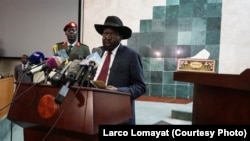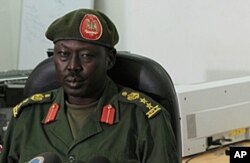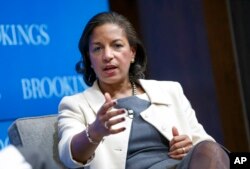The United States is proposing that the United Nations Security Council impose an arms embargo on South Sudan after President Salva Kiir refused to sign a peace deal to end a 20-month-old conflict.
The U.S. circulated a draft proposal Wednesday evening and diplomats said they expected a vote very soon.
The resolution was circulated even though Kiir earlier Wednesday told U.S. Secretary of State John Kerry in a phone call that he would sign the peace deal after "a couple of more days of consultation.''
On Monday, President Kiir declined to sign the peace deal proposed by regional leaders, saying he required more time. His opponent and former deputy Riek Machar signed it.
Oil-rich South Sudan, which gained independence from Sudan in 2011, descended into chaos in December 2013 when a political split between Kiir and Machar spiraled into armed conflict that reopened ethnic fault lines. The conflict pits Kiir's ethnic Dinka people against Machar's Nuer.
A U.S. official at the U.N. told reporters that Kiir's refusal to sign the peace deal was "outrageous."
South Sudan military spokesman Colonel Philip Aguer said fighting broke out Wednesday in the oil-producing Upper Nile state, close to the border with Sudan, with rebels trying to take areas controlled by government troops.
Aguer said fighting also had broken out Tuesday in Eastern Equatoria state, between Juba, the capital, and the town of Nimule on the border with Uganda. He said there had been no fighting in the area previously and accused the rebels of starting the latest violence in an attempt to open a new front.
Rebel spokesman Major General James Chuol blamed government troops for launching the first attack on Tuesday.
The various allegations could not be independently verified.
15 days
On Tuesday, U.S. National Security Adviser Susan Rice criticized Kiir's government for a "failure of leadership," saying it had “yet again squandered the opportunity to bring peace” and end a conflict that has killed tens of thousands and plunged the country into chaos by refusing to sign a peace agreement.
Rice said in a statement that Washington was proposing sanctions "if an agreement is not signed by the government within 15 days and a cease-fire is not implemented promptly by all parties."
According to the United Nations, the war has displaced more than 2.2 million people - 1.5 million internally and 730,000 to neighboring countries.
The U.N. mission in the country said nearly 70 percent of the country's population is facing food shortages while nearly 200,000 civilians are sheltering at U.N. bases.
'Not very surprising'
Chatham House researcher Ahmed Soliman said when a Monday deadline passed with no deal, "it was not very surprising, given the developments over the last 20 months."
Soliman said one major sticking point is power-sharing that would give each party a certain percentage of seats in the state parliaments.
Analyst Nhial Tiitmamer at the Juba-based Sudd Institute said the plan also calls for demilitarizing Juba, which government supporters see as a major infringement on their sovereignty.
“It means foreign forces would likely be the ones to protect Juba, so for them, they do not want to see this," Tiitmamer said.
He said these are tough conditions for Kiir to sell to his constituents.
“Whenever the parties were about to narrow the gap, they would be sent back for consultations. When they got back from consultations, their positions would be hardened more," Tiitmamer said.
Negotiations
Tiitmamer said the Intergovernmental Authority on Development (IGAD), the East African block leading the negotiations, made a mistake in setting a deadline for an agreement, saying the parties should have been given more time to work out an agreement themselves.
Chatham House’s Soliman said he agrees, to a point.
"We have had a lot of time. And there really is not, I think, any excuses anymore," he said.
However, Soliman and Tiitmamer are in agreement that failure to reach a peace deal damages IGAD’s credibility as a regional authority.
Steve Baragona contributed to this report from Nairobi. Some material for this report came from Reuters, AP and AFP.








